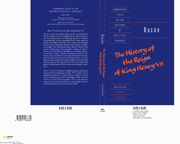Book contents
- Frontmatter
- Contents
- Editor's note
- Introduction
- Principal events in Bacon's life
- Select bibliography
- The History of the Reign of King Henry VII
- Fragmentary histories
- The History of the Reign of K. Henry the Eighth, K. Edward, Q. Mary, and Part of the Reign of Q. Elizabeth
- The beginning of the History of Great Britain
- The beginning of the History of the Reign of King Henry the Eighth
- From the Essays (1625)
- Glossary
- Index
- Cambridge Texts in the History of Political Thought
The History of the Reign of K. Henry the Eighth, K. Edward, Q. Mary, and Part of the Reign of Q. Elizabeth
Published online by Cambridge University Press: 05 June 2012
- Frontmatter
- Contents
- Editor's note
- Introduction
- Principal events in Bacon's life
- Select bibliography
- The History of the Reign of King Henry VII
- Fragmentary histories
- The History of the Reign of K. Henry the Eighth, K. Edward, Q. Mary, and Part of the Reign of Q. Elizabeth
- The beginning of the History of Great Britain
- The beginning of the History of the Reign of King Henry the Eighth
- From the Essays (1625)
- Glossary
- Index
- Cambridge Texts in the History of Political Thought
Summary
The books which are written do in their kinds represent the faculties of the mind of man: Poesy his imagination; Philosophy his reason; and History his memory. Of which three faculties least exception is commonly taken to memory; because imagination is oftentimes idle, and reason litigious. So likewise History of all writings deserveth least taxation*, as that which holdeth least of the author, and most of the things themselves. Again, the use which it holdeth to man's life, if it be not the greatest, yet assuredly is the freest from any ill accident* or quality. For those which are conversant much in poets, as they attain to great variety, so withal they become conceited; and those that are brought up in philosophy and sciences do wax (according as their nature is) some of them too stiff and opinionate, and some others too perplexed and confused. Whereas History possesseth the mind of the conceits which are nearest allied unto action, and imprinteth them so, as it doth not alter the complexion of the mind neither to irresolution nor pertinacity. But this is true, that in no sort of writings there is a greater distance between the good and the bad, no not between the most excellent poet and the vainest rhymer, nor between the deepest philosopher and the most frivolous schoolmen, than there is between good histories and those that bear the same or the like title.
- Type
- Chapter
- Information
- Publisher: Cambridge University PressPrint publication year: 1998



